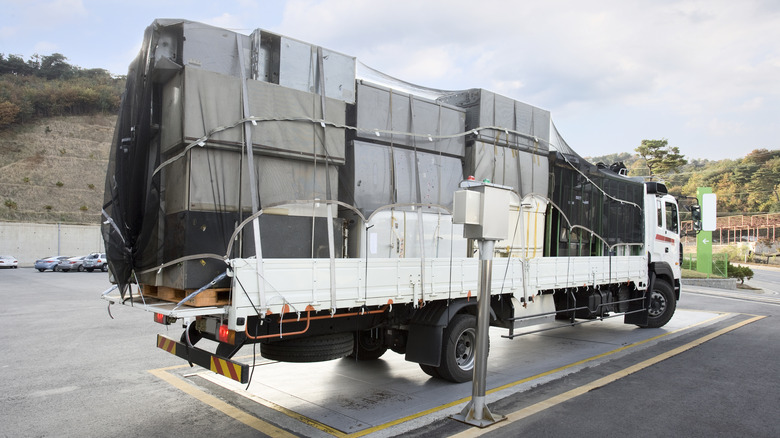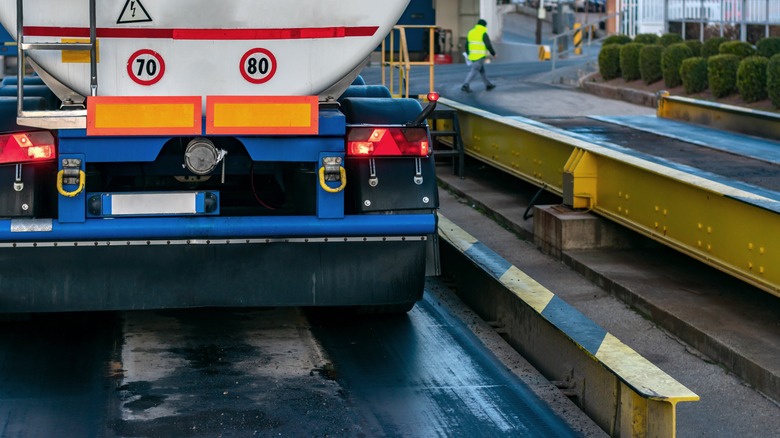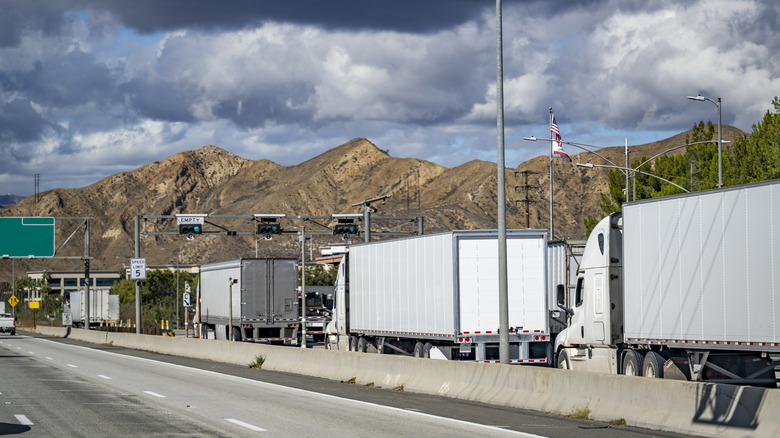The Real Reason Trucks Have To Stop For Weight Checks
For those who've spent any time commuting on the highway, the sight of trucks getting weighed is probably too common to notice. At most, it might have inspired an idle thought like, "Huh, I wonder why they do that?" And then you start imagining that something is being smuggled on board the trucks — like tons of drugs, or better yet, an alien in a life-support device. And because there's some discrepancy between the weight of the truck at its previous and current stops you realize that the alien must have been beamed on board between the two stops. And now, it's up to Mulder and Scully to track down the truck, bust open the intergalactic cargo, and blow the lid on the whole alien-conspiracy-coverup thing. And then you realize you missed your exit and will have to atone to your boss by buying everyone at the office coffee because you're late.
We only wish that there was some cool reason why trucks have to get weighed at truck stops. But no, it's not because of drug busts, illegal cargo, smuggled extraterrestrials, or anything beyond two simple reasons: 1) road maintenance, and 2) road safety. Heavier trucks tear up roads faster, the maintenance of which factors into something people tend to care about: taxes. Also, heavier trucks can be bad news for other drivers if they tilt over, pass over a fragile bridge, etc.
Stop off at the chicken coop
To be fair, the weighing of trucks factors into a critical facet of life that people encounter practically every day: the quality — or lack thereof — of roads. In the United States especially, roads and road-based transportation is absolutely integral not just to commutes and driving to and fro but also for shipping goods. As the U.S. Department of Transportation Federal Highway Administration says, there's a staggering 4 million miles of total roads crisscrossing the U.S. Of those, 164,000 miles are part of the National Highway System — aka all those I-this and I-that pothole-cratered highways that people love to gripe about (often justifiably), especially at peak hours. Truck transportation along such roads accounts for 70% of all goods shipped across the U.S., and 80% of the country's communities rely on the vehicles for everyday products, per U.S. Transport.
The reader might have noticed that trucks tend to get weighed when they cross state lines. As Nettts says, this is because the weight of truck relates to the taxes needed to maintain roads and bridges, as heavier trucks cause more damage. And so, when trucks cross state lines they shift lanes and queue up to stop and get weighed at older weighing stations, or maybe just roll over a scale at newer weighing stations. Such weighing stations — sometimes also located at road "choke points" and loading/unloading areas — are often referred to as "coops" or "chicken coops." Weight measurement duty itself usually falls to highway patrol people or inspectors with the U.S. Department of Transportation.
Penalties, fines, tickets, and more
As Nettts says, weighing a truck is a bit more complicated than weighing flour for pancakes or whatever. There are actually two main metrics used to weigh a truck: axel weight and gross weight. Axel weight is the weight placed on each set of axels along the bottom of a truck's body, gathered by taking the total weight of the cargo and its trailer, dividing it by the number of paired axels, and then combining that number with the weight of the tractor itself. The gross weight, by contrast, is just what its name says: The entire weight of everything all together at once.
Of course, disobeying truck weighing laws comes with some serious penalties. Nettts says that a truck that skips a weighing station can be pulled over, given a ticket, and then sent back to the weighing station. And if a truck is overweight, there are some serious fines to contend with — $65 per single pound overweight, as World Population Review says. Some states can even arrest a driver for carrying too heavy of a load, and each state has different weight limits. What's the final lesson here? Respect truck drivers. Even something that appears simple and mundane can be surprisingly complex and important.


